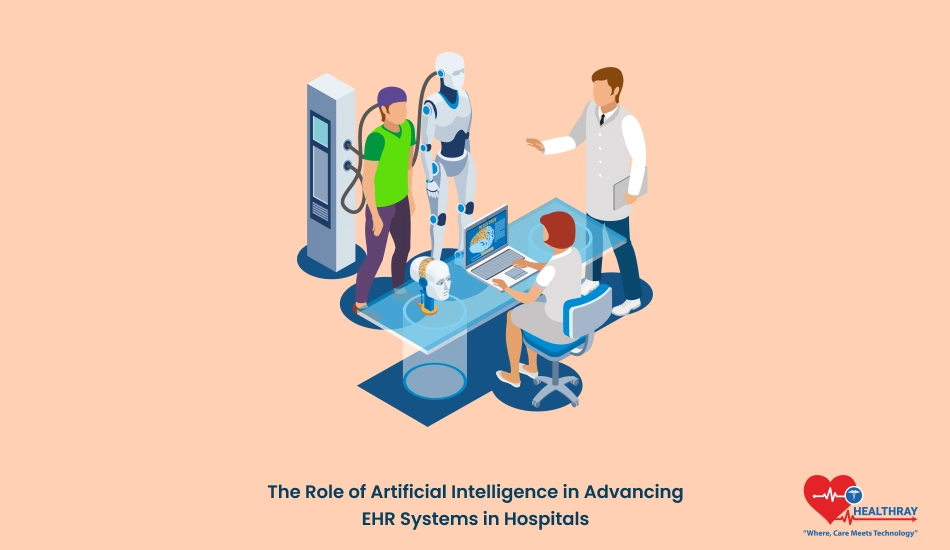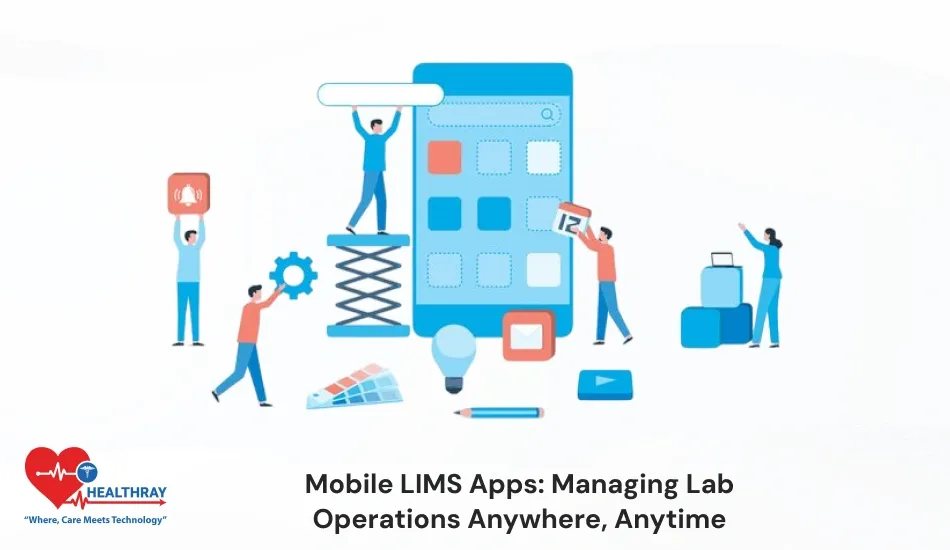Artificial intelligence (AI) is rapidly becoming a cornerstone in modern healthcare, reshaping how hospitals manage patient records and workflows. Hospitals have long faced challenges with electronic health record (EHR) systems. These systems, while necessary, are often criticized for being cumbersome and time-consuming for healthcare providers. AI offers a solution, bringing smarter, faster, and more accurate ways to manage EHR data.
This article dives into how AI is transforming EHR systems. You’ll learn how hospitals are leveraging AI to reduce administrative burdens, enhance patient outcomes, and pave the way for more efficient healthcare delivery. Whether you’re a hospital administrator, IT professional, or doctor, understanding AI’s role in EHR systems is crucial as the healthcare landscape continues to evolve.
Enhancing EHR Efficiency
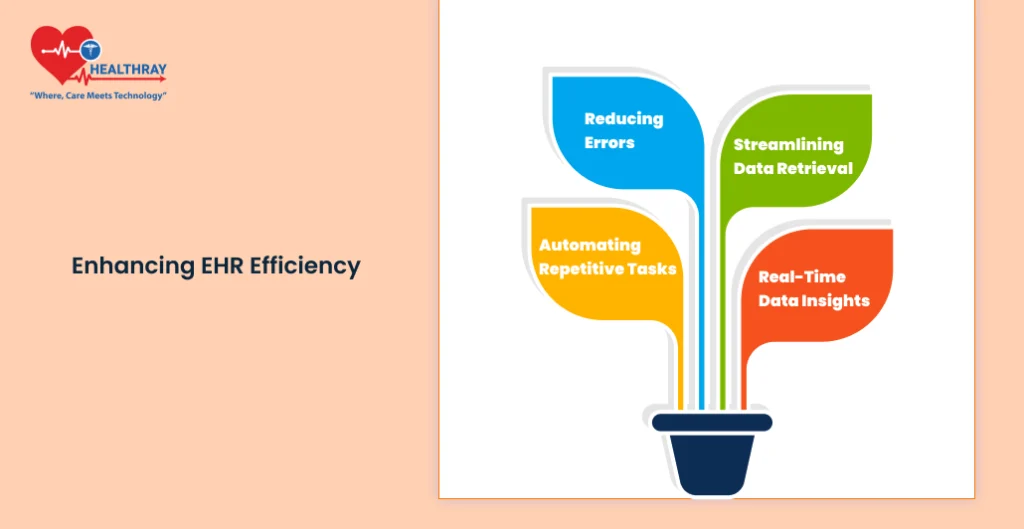
Electronic health record (EHR) systems have revolutionized patient data management, but they often come with a hefty workload for hospital staff. AI is changing that by introducing tools and technologies that automate repetitive tasks, reduce errors, and make data more actionable.
Automating Repetitive Tasks
Routine tasks such as data entry, coding, and appointment scheduling can be taken care of by AI-powered systems. These tools employ NLP to analyze clinical notes, transcribe conversations, and input information directly into the system. Such automation saves time and brings in higher accuracy in medical records.
Reducing Errors
Human error is one of the most important issues in EHR data entry. AI cross-checks information in real-time and flags inconsistencies. For example, if a dosage entered for a medication is unusually high based on patient data, the system can alert the provider immediately.
Streamlining Data Retrieval
AI simplifies the process of retrieving and analyzing patient data. Advanced search functions powered by machine learning allow healthcare providers to find specific information quickly, ensuring they can focus on patient care instead of sifting through extensive records.
Real-Time Data Insights
Beyond storage and retrieval, AI turns data into actionable insights. AI-driven dashboards can highlight trends such as patient recovery rates or common diagnoses in a hospital, helping administrators make data-driven decisions.
AI enables EHR systems to be faster, smarter, and more reliable, thus reducing staff workload and improving the overall quality of healthcare services. Hospitals adopting these developments have started experiencing improved operational efficiency and better patient care outcomes.
Predictive Analytics in Healthcare
Predictive analytics is one of the most impactful ways artificial intelligence (AI) enhances electronic health record (EHR) systems. By analyzing large volumes of patient data, AI identifies patterns and provides predictions that help healthcare professionals make informed decisions.
Identifying At-Risk Patients
AI-powered predictive tools can predict patient history and flag candidates at risk for such conditions as heart disease, diabetes, or stroke. For instance, a computer can alert doctors to take up preventive measures depending on factors like age, family history, and results from laboratory tests.
Enhancing Early Diagnoses
With AI integrated into EHR systems, subtle signs of diseases often missed during routine checks can be detected early. For instance, AI can analyze imaging reports or genetic markers within the EHR and recommend further diagnostic testing, improving early detection rates.
Optimizing Treatment Plans
Predictive analytics doesn’t only stop at diagnosis. It also is able to give a most effective treatment plan by studying similar cases. So, comparing outcomes from thousands of patients with similar profiles, AI helps physicians choose therapies that have the highest success rates.
Improving Hospital Resource Management
On a broader scale, predictive analytics aids in hospital management. AI forecasts patient admission rates based on historical data, seasonal trends, and local health patterns. This allows hospitals to allocate staff and resources more efficiently, reducing bottlenecks during peak times.
Evidence-Based Decision Support
In practice, predictive AI tools give doctors access to actual real-time, evidence-based recommendations. For instance, it can be an AI program suggesting a set of diagnostics or treatments a patient must undertake at a consultation with this patient.
Hospitals that integrate predictive analytics into their EHR systems experience improved patient outcomes, more efficient resource utilization, and enhanced decision-making capabilities. These tools shift healthcare from reactive to proactive, a critical step in modern medicine.
Reducing Administrative Burden and Physician Burnout
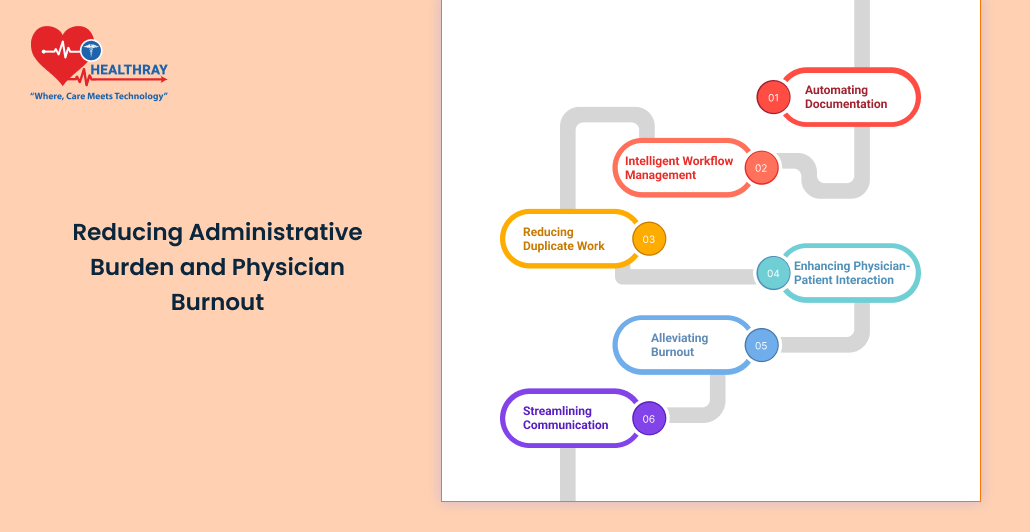
Administrative tasks have long been a pain point for healthcare providers, often leaving doctors and staff overwhelmed with paperwork and reducing the time spent on patient care. AI integration into EHR systems is proving to be a game-changer by automating many of these burdensome tasks.
Automating Documentation
With the advent of AI-powered tools equipped with NLP, the transcription of patient interactions and automatic filling of EHR fields become possible. It eliminates the requirement for manual data entry, enabling physicians to spend more time diagnosing and treating patients rather than typing notes into a computer.
Intelligent Workflow Management
AI systems help prioritize tasks by flagging urgent cases and organizing workloads more effectively. For example, AI can automatically schedule follow-ups, send reminders to patients, and ensure that routine administrative responsibilities are completed on time.
Reducing Duplicate Work
EHR systems powered by AI can identify redundant or duplicate entries, reducing inefficiencies. This ensures that healthcare staff do not waste time re-entering data or correcting repetitive errors.
Enhancing Physician-Patient Interaction
By handling routine tasks, AI frees up time for doctors to engage more meaningfully with their patients. This not only improves the quality of care but also enhances job satisfaction among healthcare providers.
Alleviating Burnout
Medical professionals are the most significant sufferers of burnout. They report that administrative work is the main reason for this. AI reduces that load and allows physicians and nurses to maintain a healthier work-life balance. Hospitals have shown an increased satisfaction rate among their teams.
Streamlining Communication
AI can also facilitate seamless communication between departments by providing real-time updates and automatically sharing relevant data. This minimizes delays and ensures everyone has access to the most up-to-date information.
Hospitals embracing AI to reduce administrative burdens see measurable improvements in staff efficiency, satisfaction, and patient care quality. These advancements demonstrate how technology can humanize healthcare by allowing professionals to focus on their core mission—treating patients.
Implementation Strategies for Hospitals
Integration of AI into current EHR systems can be a daunting process, but with the right strategy, hospitals will be able to adopt this transformative technology with success. The article describes how hospitals can approach implementing AI to maximize benefits while minimizing disruption.
Assessing Needs and Goals
The first step is to identify the pain points in the current EHR system. Are physicians spending too much time on documentation? Are there gaps in patient care coordination? Hospitals must define specific goals, such as reducing administrative burden, improving data accuracy, or enhancing predictive capabilities.
Choosing the Right AI Vendor
Not all AI tools are created equal. Hospitals should evaluate vendors based on:
- Proven experience in healthcare AI.
- Integration capabilities with existing EHR systems.
- Regulatory compliance and data security standards.
- User-friendly interfaces that minimize training requirements.
Building Cross-Functional Teams
Implementation of this system requires collaboration between hospital administrators, IT professionals, and clinical staff. A cross-functional team ensures that all perspectives are considered, from technical feasibility to practical usability in daily workflows.
Training Staff
Introducing AI requires proper training for doctors, nurses, and administrative staff. Hospitals should:
- Organize workshops and training sessions.
- Provide hands-on demonstrations of AI tools.
- Offer ongoing support to address questions and challenges.
Starting Small with Pilot Programs
To avoid overwhelming the system, hospitals can begin with small-scale pilot projects. For example, they might test AI-driven transcription tools in one department before rolling them out across the facility. Pilot programs allow hospitals to evaluate performance and make adjustments.
Monitoring Performance Metrics
Hospitals should establish key performance indicators (KPIs) to measure the success of AI integration. Metrics might include:
- Reduction in time spent on documentation.
- Decrease in EHR-related errors.
- Improvements in patient care outcomes.
- Cost savings or return on investment.
Addressing Data Security
Ensuring the security and privacy of patient data is paramount. Hospitals must:
- Verify that AI tools comply with healthcare regulations like HIPAA.
- Implement robust encryption protocols.
- Regularly audit AI systems for vulnerabilities.
Scaling and Optimization
Once pilot programs are successful, hospitals can scale AI implementation across departments. Continuous optimization ensures that the tools remain effective as workflows evolve and data volumes grow.
By following these steps, hospitals can seamlessly integrate AI into their EHR systems, unlocking efficiencies and elevating patient care. A structured approach reduces resistance to change and ensures that the transition benefits both staff and patients.
Challenges and Considerations
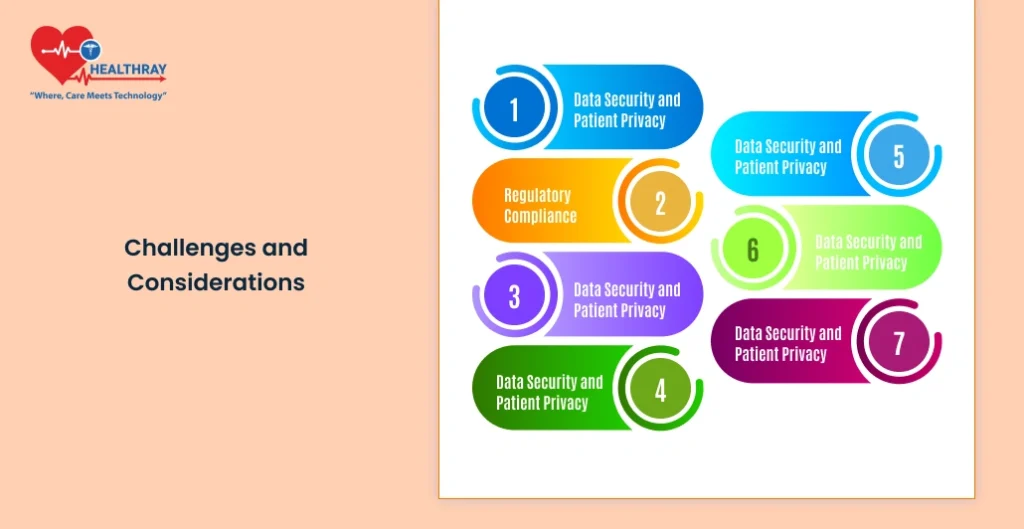
However, the assimilation of AI with EHR systems comes with a bundle of challenges. There are several issues, which need to be established and addressed for smooth implementation in hospitals without compromising security.
Data Security and Patient Privacy
One of the biggest concerns with AI in healthcare is maintaining the privacy and security of sensitive patient data. Hospitals must:
- Ensure compliance with healthcare regulations such as HIPAA.
- Implement strong encryption and multi-factor authentication for accessing AI systems.
- Regularly audit AI algorithms to prevent data breaches.
Regulatory Compliance
AI tools must align with local and international healthcare regulations. Hospitals need to:
- Work with vendors experienced in regulatory compliance.
- Stay updated on evolving policies regarding AI and EHR systems.
- Ensure that any AI-driven decisions can be explained and justified to meet legal requirements.
Resistance to Change
Staff may resist the introduction of AI tools due to fear of job displacement or difficulty adapting to new workflows. To overcome this, hospitals should:
- Emphasize AI’s role as a support tool, not a replacement for human expertise.
- Provide hands-on training and support to build confidence in using the technology.
- Involve staff in the selection and design of AI systems to ensure their needs are met.
Algorithm Bias and Accuracy
AI systems rely on data for training, and if this data is biased, the algorithms can produce skewed outcomes. Hospitals must:
- Regularly review and validate AI outputs.
- Use diverse and representative datasets during the training phase.
- Work with vendors to refine algorithms based on real-world feedback.
High Implementation Costs
The upfront cost of AI implementation can be significant, particularly for smaller hospitals. These costs include purchasing software, upgrading hardware, and training staff. Hospitals can address this by:
- Seeking government grants or partnerships with technology providers.
- Demonstrating the long-term return on investment through efficiency gains and cost savings.
Dependence on Reliable Infrastructure
AI systems require robust IT infrastructure to function efficiently. Hospitals must:
- Invest in high-speed networks and cloud storage solutions.
- Ensure reliable power supplies and backup systems.
- Prepare for ongoing maintenance to prevent system downtime.
Continuous Updates and Learning
AI technologies evolve rapidly, and hospitals need to keep systems updated. This involves:
- Partnering with vendors for regular software updates.
- Allocating resources for staff to stay informed about advancements in AI tools.
- Periodically reassessing AI’s performance to align with organizational goals.
By addressing these challenges proactively, hospitals can create a solid foundation for AI integration. Tackling these considerations ensures that AI-enhanced EHR systems are not only effective but also trusted by both staff and patients.
Real-World Success Stories
Implementing artificial intelligence in electronic health record systems has delivered outstanding results in hospitals worldwide. Real-world examples highlight how these advances improve patient care, fast-track operations, and resolve long-standing problems.
Reducing Documentation Time
A large metropolitan hospital introduced an AI-driven transcription tool to assist doctors with note-taking during consultations. The system used natural language processing (NLP) to convert spoken words into structured EHR entries. Within six months:
- Documentation time was reduced by 40%.
- Physicians reported spending more time interacting with patients.
- Administrative errors in records decreased significantly.
Improving Diagnostic Accuracy
A regional hospital specializing in oncology adopted an AI tool that analyzed patient data for early detection of cancer. By integrating this tool into their EHR system:
- Early cancer detection rates improved by 25%.
- Treatment plans were initiated sooner, leading to better patient outcomes.
- Staff reported enhanced confidence in AI-supported decision-making.
Enhancing Resource Allocation
A community hospital facing frequent staff shortages implemented predictive analytics to forecast patient admissions and resource needs. Using AI, they were able to:
- Optimize staff schedules and reduce overtime costs.
- Improve bed management, reducing wait times for patients.
- Increase operational efficiency during peak flu season.
Streamlining Communication
A large academic medical center incorporated AI to manage interdepartmental communication through its EHR system. AI flagged critical lab results and ensured timely delivery to the appropriate care teams. This integration:
- Reduced delays in patient treatment.
- Improved collaboration among doctors, nurses, and lab technicians.
- Enhanced overall patient satisfaction.
Achieving Cost Savings
A hospital group implemented an AI-driven billing assistant within its EHR system to manage insurance claims and reduce billing errors. Over the first year:
- Claim rejections dropped by 30%.
- Revenue cycle efficiency increased, leading to millions in recovered funds.
- Administrative staff workloads were significantly reduced.
These success stories demonstrate how AI is not just a theoretical innovation but a practical solution delivering tangible benefits. Hospitals that leverage AI effectively in their EHR systems position themselves as leaders in modern healthcare.
Future of AI in EHR Systems
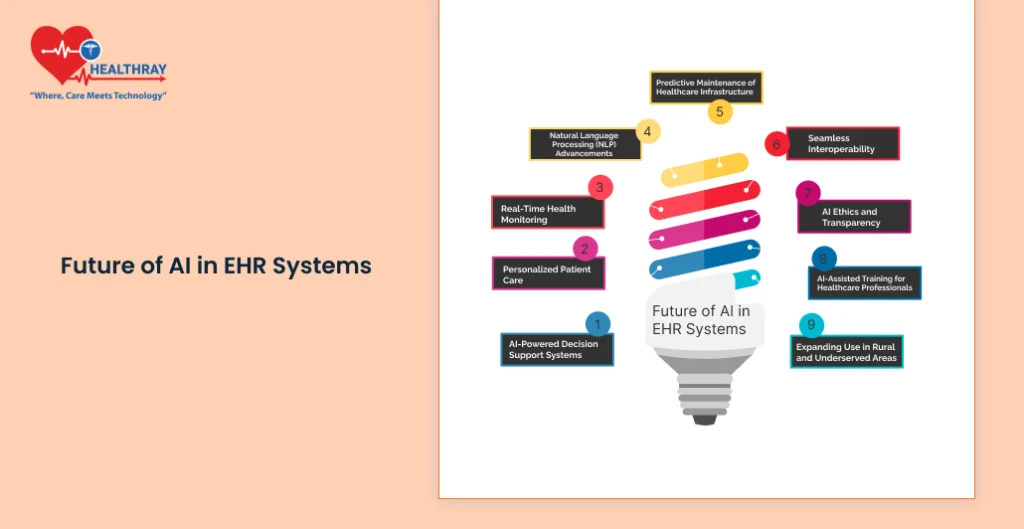
The future of artificial intelligence (AI) in electronic health record (EHR) systems holds immense potential. Emerging trends indicate that AI will continue to transform healthcare operations, improve patient outcomes, and redefine how hospitals utilize data.
AI-Powered Decision Support Systems
Artificial intelligence is expected to play an increasingly important role in the clinical decision-making process. Advanced algorithms will provide in real-time, evidence-based recommendations for treatment plans, medication adjustments, and diagnostic tests, helping healthcare professionals to deliver precise care.
Personalized Patient Care
Future AI systems will enable highly personalized care by analyzing a combination of genetic, environmental, and lifestyle data. This could lead to customized treatment plans tailored to individual patient profiles, improving the effectiveness of interventions.
Real-Time Health Monitoring
Wearable devices and IoT (Internet of Things) technology will be integrated into EHR systems, enabling AI to monitor patients’ health in real-time. This may allow for early detection of medical issues, which can prevent hospital readmissions and enhance long-term health outcomes.
Natural Language Processing (NLP) Advancements
As NLP technology evolves, AI tools will become even more adept at understanding and processing unstructured data, such as handwritten notes or patient feedback. This will further reduce manual entry requirements and enhance data accessibility.
Predictive Maintenance of Healthcare Infrastructure
AI could extend beyond patient care to predict when medical equipment or IT systems might require maintenance. Hospitals could use these insights to prevent downtime and ensure smooth operations.
Seamless Interoperability
In the future, AI will help in seamless interoperability between different EHR systems. This will help hospitals to share and access patient data securely, improve coordination among multiple care providers, and reduce redundant testing or procedures.
AI Ethics and Transparency
As AI becomes more integral to healthcare, there will be a stronger emphasis on transparency, explainability, and ethical considerations. Hospitals will likely adopt frameworks to ensure AI systems operate fairly and without bias.
AI-Assisted Training for Healthcare Professionals
AI-driven simulations and training modules could prepare medical staff to handle complex scenarios. This would improve both the efficiency and quality of professional development programs.
Expanding Use in Rural and Underserved Areas
Scalability in AI means that it can bring advanced diagnostic tools and predictive analytics to the underserved regions of healthcare, which can address healthcare disparities. Cloud-based EHR systems powered by AI can fill gaps in accessibility.
The integration of AI with EHR systems is poised to drive smarter, more efficient healthcare practices. As these technologies evolve, hospitals must stay proactive, adopting innovations that align with their mission to improve patient care and operational efficiency.
Conclusion
Artificial intelligence is transforming electronic health record systems in ways that directly benefit hospitals, healthcare professionals, and patients. By automating routine tasks, providing predictive insights, and improving data accuracy, AI enables better decision-making, enhanced patient care, and reduced burnout for staff.
For Hospital Management System, AI presents an opportunity to make operations more efficient and optimize resource utilization. Healthcare IT professionals can use AI to enhance data security and interoperability, while doctors benefit from reduced administrative burdens and access to real-time decision support.
The adoption of AI in EHR systems not only means embracing technology; it also means the efficient and patient-centered provision of healthcare. Hospitals that have begun to adopt AI today stand better prepared for the medical demands of tomorrow.
If your hospital is considering AI integration, then start by identifying pain points, involving cross-functional teams, and beginning with pilot programs. The road may have challenges, but the rewards for both staff and patients are undeniable.
